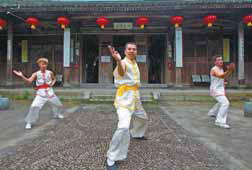 |
|
Wu Shouwu, a Southern Boxing practitioner, imparts his skills to students in Yongjia county, Zhejiang province. Gao Erqiang / China Daily
|
When a place in China is recognized as a UNESCO World Heritage site, it is normally associated with money making, where tourists and cash are expected to flow in, and jobs created.
But Nanxijiang, a 1,000-year-old town with 27 intangible cultural heritages designated by the country and UNESCO, is an exception.
There is no trace of prosperity - only some weather-beaten houses - and not much tradition is left.
Home to 900,000, many of the town's cultural heritages are on the verge of extinction. They include Yongjia Kunqu Opera and nanquan (Southern Boxing), according to the Intangible Cultural Heritage Protection Center of Yongjia county, the administrative body of the area.
"In the past, the area was abuzz with bread-making handicrafts and other local entertainment. But now, nobody cares," says Wang Lingxiao, vice-director of the center.
"Both the practitioners and audiences are few in numbers and old. But they are the most precious and unique cultural wealth of our nation. We need to pass it down to the next generation."
According to the latest national survey about intangible culture heritage, one-third of traditional operas that originated in Zhejiang province have died out over the past 60 years and 30 percent of traditional dances have disappeared.

 'Taken 2' grabs movie box office crown
'Taken 2' grabs movie box office crown
 Rihanna's 'Diamonds' tops UK pop chart
Rihanna's 'Diamonds' tops UK pop chart
 Fans get look at vintage Rolling Stones
Fans get look at vintage Rolling Stones
 Celebrities attend Power of Women event
Celebrities attend Power of Women event
 Ang Lee breaks 'every rule' to make unlikely new Life of Pi film
Ang Lee breaks 'every rule' to make unlikely new Life of Pi film
 Rihanna almost thrown out of nightclub
Rihanna almost thrown out of nightclub
 'Dark Knight' wins weekend box office
'Dark Knight' wins weekend box office
 'Total Recall' stars gather in Beverly Hills
'Total Recall' stars gather in Beverly Hills


















